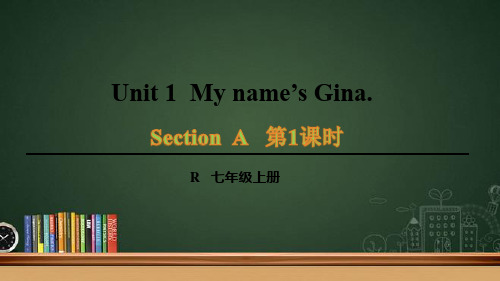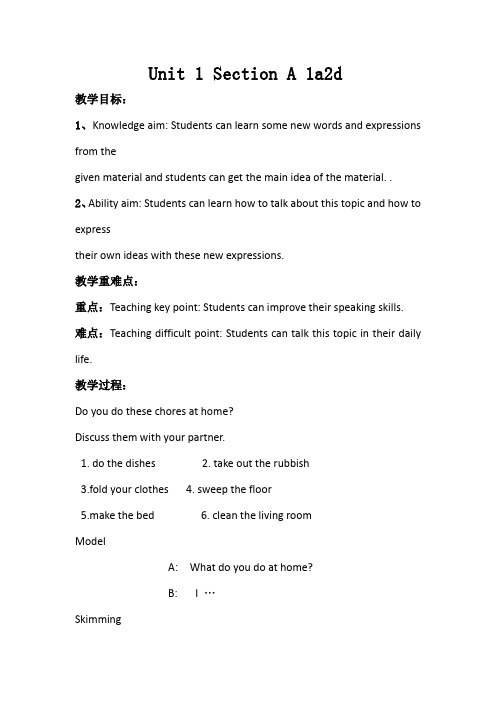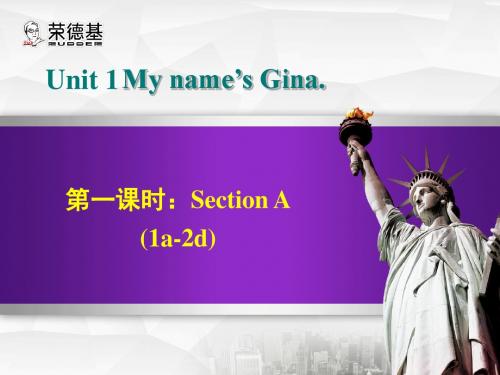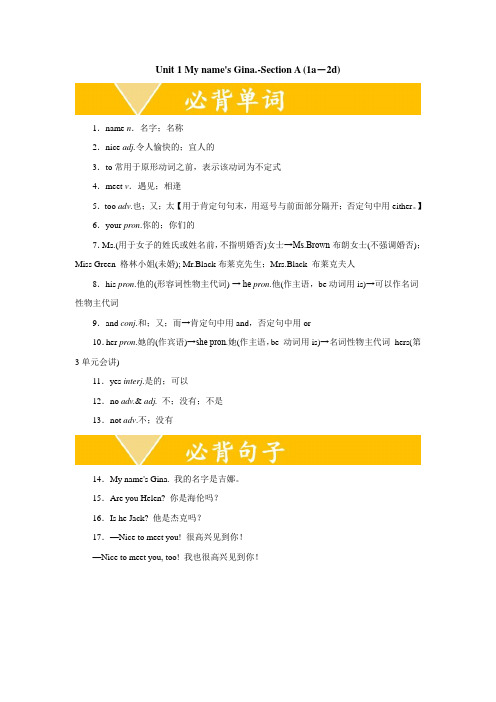unit1 1a-2d
人教版七年级英语上 Unit 1 Section A 1a-2d

Listen again. Fill in the blanks.
Bob: Excuse me, are _y_o_u_ Eric? Eric: Yes, __I__ am. Are you Mike? Bob: No, I’m not. I’m Bob. Nice to meet _y_o_u_. Eric : Nice to meet you, _t_o_o_.
B. y. your; Your
39
2c Practice the conversations in pairs.
A: Hello! What’s your name? B: My name’s … A: I’m … B: Nice to meet you!
what’s是what is的缩写。有时句末也可以加上please, 以示客气、礼貌, 读时用降调。
①My name is. . . (2)其答语形式有三种: ②I’m. . .
③直接用姓名
13
【学以致用】 ①My name is John Smith. (对画线部分提问)
What’s your name? ②— What’s her name ? (根据答语写问句)
我的名字 my name 你的钥匙 your key 他的钢笔 his pen 她的直尺 her ruler
【知识构建】
36
人称 代词分类
第一人称 第二人称 第三人称
主格
I
you he she it
形容词性 物主代词 my
your his her its
37
【温馨提示】 当名词前已有形容词性物主代词修饰时, 不
He is Bob.
She is Alice.
Unit1SectionA1a-2d教案(五四制)英语八年级上册

Unit 1 Section A 1a2d教学目标:1、Knowledge aim: Students can learn some new words and expressions from thegiven material and students can get the main idea of the material. .2、Ability aim: Students can learn how to talk about this topic and how to expresstheir own ideas with these new expressions.教学重难点:重点:Teaching key point: Students can improve their speaking skills.难点:Teaching difficult point: Students can talk this topic in their daily life.教学过程:Do you do these chores at home?Discuss them with your partner.1. do the dishes2. take out the rubbish3.fold your clothes4. sweep the floor5.make the bed6. clean the living roomModelA: What do you do at home?B: I …SkimmingThis means looking quickly through a piece of writing to find the main idea without reading every word. It is still a good idea to read the first sentence in each paragraph a little more carefully.They are probably about whether kids should________.A. spend time on schoolworkB. help out with chores at homeC. learn to be independent(独立的)Dear Sir,I do not understand why some parents make their kids help with housework and chores at home. Kids these days already have enough stress from school.They do not have time to study and do housework, too. Housework is a waste of their time. Could we just let them do their job as students? They should spend their time on schoolwork in order to get good grades and get into a good university. Also, when they get older, they will have to do housework so there is no need for them to doit now. It is the parents’job to provide a clean and fortable environment at home for their children. And anyway, I think doing chores is not so difficult. I do not mind doing them.Ms. MillerDear Sir,I think it is important for children to learn how to do chores and helptheir parents with housework. It is not enough to just get good grades at school. Children these days depend on their parents too much. They are always asking, “Could you get this for me?”or “Could you help me with that?”Doing chores helps to develop children's independence and teaches them how to look after themselves. Italso helps them to understand the idea of fairness. Since they live in one house with their parents, they should know that everyone should do their part in keeping it clean and tidy. Our neighbors’son got into a good college but during his first year, he had no idea how to take care of himself. As a result, he often fell ill and his grades dropped. The earlier kids learn to be independent, the better it is for their future.Mr. SmithMake conversations between Peter and his father.Ask for permission礼貌地取得同意A: Could I use your puter?B: Sorry. I'm going to work on it now.A: Well, could I watch TV?B: Yes, you can, but first you have to clean your room.homework.Help your parents do housework..Make a new conversation about housework.DiscussionQ1: Do you help your parents do the chores at home?Q2: Do you ask your parents’permission for?Q3: Do your parents ask you to do some things for them? What do your parents ask you to do?study harddo choresgo to the store/supermarket to buy things for them。
人教版七年级英语上册 Unit 1 SectionA (1a-2d)

meet you, too.(我也很高兴认识你。)”,注意
too前要加逗号和前面部分隔开。
讲解来自《点拨》
eg:Wang Tao: Liu Li, this is Wang Hao. 王涛:刘丽,这是王浩。
Wang Hao:Nice to meet you.
王浩:很高兴认识你。 Liu Li:Nice to meet you, too. 刘丽:我也很高兴认识你。 拓展 还有下列打招呼的问候语: 初次认识可以说: —Glad to meet you. —Glad to meet you,too.
讲解来自《点拨》
—How do you do? —How do you do?
熟人、朋友之间问候要用:
—Glad/Nice to see you. —Glad/Nice to see you,too.
—How are you?
—I'm fine/Not bad/Very well,thank you. And you? 小孩或年轻人可以比较随便地说: —Hello!/Hi! —Hello!/Hi!
讲解来自《点拨》
典例
—Mom,this is my friend,Nick. —________ (安徽省安庆市十六校联考) C A.Thank you. C.Glad to meet you. B.OK. D.How are you?
【点拨】此题运用交际法。在交际用语中介绍他人
“This is...”,答语可用“Glad to meet you.” 或“Nice to meet you.”
Unit 1 My name’s Gina.
第一课时:Section A
(1a-2d)
第一课时:Section A (1a-2d)
人教版八年级上册英语 Unit 1 Section A (1a-2d) 授课课件

是指某些人或物中的“任何一个”,用来表明只限一个
辨析:anyone, anybody与anyone
都指“任何人”,其后一般不接 anybo of,作主语时,谓语动词用第三
dy, 人称单数形式。 anyon 后面不可接动词的否定形式;如
e 果要表达全部否定, 主语用 nobody。 是指某些人或物中的“任何一
.
课文呈现
1c. Makeconversationsaboutthepeopleinthepicture. A:WheredidTinagoonvacation? B:Shewenttothemountains.
课文呈现
People Grace Kevin Julie
Places
Thebeach Home
考点精讲
考点5 quiteafew相当多;不少
修饰可数名词 复数,相当于 many和quite a lot of。
e.g. Quiteafewstudentsgotoschoolbybike.
相当多的学生骑自行车上学。
拓 展 : quitealittle 表 示 “ 相 当 多 ; 不 少 ” , 相 当 于
考点精讲
③Oh, didyougoanywhereinteresting?
考点3 (重点)anywhere/'eniweə/adv. 在任何地方 形容词修饰复合不定代词、不定副词时,位于不定 代词、不定副词的后边。
anywhere常用于否定句和疑问句中,表示“在任何 地方”;如果用在肯定句中,表示“在(或去)任 何地方,随便哪个地方”。
? Grace: Yes. I went with my mother. Boy: Did you go to Central Park? Grace: Yes, I did. It was really nice. Boy: Did you buy anything special? Grace: Yes. I bought something for my f
人教版初中英语八年级上册Unit 1 Section A 1a—2d,(共16张PPT)

1
2
3
4
5
Writing If you are Li Hua , introduce your friends and your vacation in the chart.
Exercise: I.写出下列短语: 1.呆在家___________2.去纽约市__________ 3.去海滩___________4.去夏令营___________ 5.去爬山___________6.拜访我的叔叔_______ 7.参观博物馆________ II.用所给单词的适当形式填空:
13、He who seize the right moment, is the right man.谁把握机遇,谁就心想事成。21.8.2421.8.2422:49:0322:49:03August 24, 2021
•
14、谁要是自己还没有发展培养和教育好,他就不能发展培养和教育别人。2021年8月24日星期二下午10时49分3秒22:49:0321.8.24
•
11、只有让学生不把全部时间都用在学习上,而留下许多自由支配的时间,他才能顺利地学习……(这)是教育过程的逻辑。21.8.2422:49:0322:49Aug-2124-Aug-21
•
12、要记住,你不仅是教课的教师,也是学生的教育者,生活的导师和道德的引路人。22:49:0322:49:0322:49Tuesday, August 24, 2021
A: Where did you go on vacation? B: I visited my uncle. C: I went to the beach. D: ... E: ...
A game: Choose a number and use the picture under it to ask and anwer.
新目标七年级上册 Unit 1-Section A(1a-2d)知识梳理

Unit 1 My name's Gina.-Section A (1a-
2d)
2.nice adj.令人愉快的;宜人的
3.to常用于原形动词之前,表示该动词为不定式
4.meet v.遇见;相逢
5.too adv.也;又;太【用于肯定句句末,用逗号与前面部分隔开;否定句中用either。
】6.your pron.你的;你们的
7.Ms.(用于女子的姓氏或姓名前,不指明婚否)女士→Ms.Brown布朗女士(不强调婚否);Miss Green 格林小姐(未婚); Mr.Black布莱克先生;Mrs.Black 布莱克夫人
8.his pron.他的(形容词性物主代词) → he pron.他(作主语,be动词用is)→可以作名词性物主代词
9.and conj.和;又;而→肯定句中用and,否定句中用or
10.her pron.她的(作宾语)→she pron.她(作主语,be 动词用is)→名词性物主代词hers(第3单元会讲)
11.yes interj.是的;可以
12.no adv.& adj.不;没有;不是
13.not adv.不;没有
14.My name's Gina. 我的名字是吉娜。
15.Are you Helen? 你是海伦吗?
16.Is he Jack? 他是杰克吗?
17.—Nice to meet you! 很高兴见到你!
—Nice to meet you, too! 我也很高兴见到你!。
人教版英语八年级上册Unit1(1a-2d)精品PPT课件
考向一: somewhere 意为“在某处”,常用于肯定句中, anywhere 意为“在任何地方”,常用于否定句和疑问句中。 Eg: Are you going anywhere tonight? 今晚你要去什么地方吗?
拓展:everywhere 意为“到处;各个地方”,相当于here and there。nowhere 意为“无处,哪里都不”,表示否定 意义。
mountains __a___ 6. went to the beach _f _
7. visited museums__g_
Words
anyone anywhere wonderful few quiet a few most
pron.任何人 adv.在任何地方 adj.精彩的,绝妙的 adj&pron.不多,很少 相当多,不少
拓展1:most of... 意为“……中的大多数”,它作主 语时,谓语动词的单复数形式取决于most of后的名 词或者代词。 Eg:Most of us are going to the park.我们大多数 人要去公园。
Most of the food goes bad.大部分的食物都变 质了。
That's great! 等。
典例:---There’ ll be a film tonight.
---___D_____! Let's go to the cinema together.
A.Take it easy
B.What a shame
C.With pleasure
D.Wonderful
B: Yes, I went to Beijing with my family.
人教版七年级下册英语Unit 1 Section A (1a-2d)
2a
Listentothesetwoconversationsandcircletheclubsyouh ear.
a. Englishclub b. artclub c. musicclub d. chessclub e. swimmingclub
—Whatclubdoyouwanttojoin? 7 —Iwanttojointhechessclub.
e.g. MayIspeaktoLucy? 我可以和露西通话吗?
① 辨析:speak, say, talk与tell
tellsb.
sth.= tellsth.
vt. 说(某种
①speak+语言 说某种语
tsopsbe.a 告某诉人k
语言)vi. 说 话
言 ②speak to sb. 跟某人说
某事
话
________.
English
3. MEanryglliiksehsmusic. Shecan_______and_______. Boblikes
music, too. Theywanttojointhe________club.
sing
dance
music
2b
Conversation 1 David: What club do you want to join, Lisa? Lisa: I want to join the chess club. David: Can you play chess? Lisa: No, I can’t. What about you, John? John: I can.
a2
f3
—Iwanttojointheartclub.
4
—Canyoudraw?
人教版九年级全一册unit 1 1a~2d课件
A.According B.by C.below
猜测单词by 的含义: I know the wordby looking up thedictionary.
1
2
通过1和2,可猜测by的含义: by:介词.通过…的方式.
知识巩固: 翻译下面的句子:
4.Sound听起来….. 后接形容词。和本词用法一致的还有:look、 feel、taste……. ( A )1. The red coat____beautiful.
A.looks B.feel C.sound
( B )2. Your idea_____good. A.look B.sounds C.sound
Unit1 How can we become good learners?
SectionA(1a~2d)
词汇过招:
textbook /ˈteksbʊk/ n.教科书;课本 conversation /kɒnvəˈseiʃn/ n.对话;谈话
aloud /əˈlaʊd/ adv. 大声地;出声地
sentence /ˈsentəns/ n.句子
11、越是没有本领的就越加自命不凡 。21.8.3 20:20:2 120:20 Aug-21 3-Aug-2 1 12、越是无能的人,越喜欢挑剔别人 的错儿 。20:20: 2120:2 0:2120: 20Tues day, August 03, 2021 13、知人者智,自知者明。胜人者有 力,自 胜者强 。21.8.3 21.8.32 0:20:21 20:20:2 1Augus t 3, 2021 14、意志坚强的人能把世界放在手中 像泥块 一样任 意揉捏 。2021 年8月3 日星期 二下午8 时20分 21秒20 :20:212 1.8.3 15、最具挑战性的挑战莫过于提升自 我。。2 021年8 月下午 8时20 分21.8.3 20:20A ugust 3, 2021 16、业余生活要有意义,不要越轨。2 021年8 月3日 星期二8 时20分 21秒20 :20:213 August 2021 17、一个人即使已登上顶峰,也仍要 自强不 息。下 午8时20 分21秒 下午8 时20分2 0:20:21 21.8.3
Unit 1How can we become good learners(1a-2d)
九年级 英语 上册 人教版
5.The more you read,the faster you'll be.你读得越多,你就会读 得越快。 the+比较级,the+比较级表示“越……,就越……”。 6.其他重点短语 study for a test 复习备考 give a report 作报告 spoken English 英语口语 at first 起初 word by word 逐词地;逐字逐句地
九年级 英语 上册 人教版
3.patient adj.有耐心的 n.病人
其常用短语:be patient with...对……有耐心 4.It's too hard to understand spoken English.理解英语口语太难 了。
(1)It+be+adj.+to do sth.做某事是……的。
九年级 英语 上册 人教版
二、单项填空。
( D )1.▲(黔西南州中考)The children here improve their English
______ listening and speaking every day.
A.on B.through C.with D.by
( A )2.—Did you eat anything special?
(2)too...to...意为“太……而不能”,相当于 so...that...或 not...enough to...。 如:The box is too heavy for me to lift.=The box is so heavy that I can't lift it.=The box isn't light enough for me to lift.
- 1、下载文档前请自行甄别文档内容的完整性,平台不提供额外的编辑、内容补充、找答案等附加服务。
- 2、"仅部分预览"的文档,不可在线预览部分如存在完整性等问题,可反馈申请退款(可完整预览的文档不适用该条件!)。
- 3、如文档侵犯您的权益,请联系客服反馈,我们会尽快为您处理(人工客服工作时间:9:00-18:30)。
序号:授课日期:课型:听说课班级:八年课题:Unit 1 What’s the matter?Section A 1a-2d教学目标:1.语言知识目标:1) 能掌握以下单词以及短语:matter, sore, have a cold, foot, neck, stomach, throat, fever, lie, lie down, rest, cough, toothache, headache, break, hurt, enough water, take breaks away from, all weekend, take one’s temperature, in the same way, go to a doctor, see a dentist, get an X-ray, cut oneself.2) 能熟悉以下句型:What’s the matter with…?”“What should I/ you/ he/ she/they… do?”“I/ you/ he/ she/they should do…”2. 情感态度价值观目标:教会学生关心他人,培养同学间团结、友善的精神。
教学重点:掌握相关的单词和词组,并能够灵活运用。
会使用以下句型:“What’s the matter with…?”“What should I/ you/ he/ she/they… do?”“I/ you/ he/ she/they should do…”教学难点:学生对听力材料中新句型、新词组的理解。
二次备课教学流程Warming up by learning grammarTo begin with, go to page 8, and let’s learn to use have for talkingabout health problems and modal verbs should/shouldn’t.I have a headache. You should go to bed.He has a stomachache. He shouldn’t eat anything.She has a toothache. She should see a dentist.Warming up by discussingHello, everyone!Can you name the parts of your body? How many parts of the bodycan you name? Let’s look at the doll and name the parts of the body.arm, back, ear, eye, foot, hand, head, leg, mouth, neck, nose,stomach, toothNow let’s read the words together.arm, back, ear, eye, foot, hand, head, leg, mouth, neck,nose, stomach, toothKeeping healthy is very important. So today we will talk about it.Let’s look at Unit 1 What’s the matter?1A Writing the lettersNow open your books and turn to page 7. Please look at the pictureand read the name of the body parts.OK. Now look at the picture of the students numbered 1 through 5.Several body parts are marked with the letters a ~ m. Write the correctletter after the name of each body part on the list. You must completethe activity individually.Let’s check the answer, please.1b Listening and numberingCan you tell what part of the body d oesn’t feel good? Now let’s learnthe new words in the picture. Please read after me.matter sore have cold have a cold throatGood. Let’s listen to the recording. There are conversations about each of these five students. Look at the picture and find the people that are being talked about. Listen to the tape and write the number next to them in the picture next to their names. The first one has been done for you.Let’s check the answers, please.And finally let’s read the tapescript to blacken all examples of have for talking about health problems and examples of modalshould/shouldn’t.1c Doing pairworkCan you express what part of the body doesn’t feel goodnow? Work in pairs. Make your own conversations out of the picture on page 7. Then present your conversations to the whole class, using have for talking about health problems.2a Listening and matchingTaking care of your friends or family member isvery important. Now please look at page 8, 2a. Readthe eight items in this activity. When you read youmust call attention to the meaning of the new words. Then listen to the recording. On this recording there are four different conversations. People are talking about health problems they have and are getting advice for them. Draw lines to match the problems with the advice.The first time, you only listen. The first one has been done for you. The boy has a toothache and the advice is to see a dentist.The second time, you draw lines to match the problems and the advice.Answers:2b Listening and fillingVery good. These conversations are illustrated by the pictures. Now listen again and fill in the blanks. First look at the four pictures. Each of these pictures illustrates one of the conversations. This time, listen for the missing words. Write the missing words on the blank lines.Now read the tapescript and blacken all examples of have for talking about health problems and examples of modal should/shouldn’t.2c Doing pairworkNow let’s look at a conversation. Who wants to read it to the class? You two, please.A:What’s the matter?B: I have a toothache.A:Maybe you should see adentist.B:That’s a good idea.Good. You are going to make a conversation in pairs using the information from activities 2a and 2b.Take turns having problems and giving advice.A:What’s the matter?B: I have a sore throat.A:Maybe you should drink some hot teawith honey.B:That’s a good idea.Role-play the conversation.先带领学生学习书中对话部分所出现的语法知识,新的词组以及新的句型。
并要求学生熟读本部分课文。
对话中主要词组:take breaks away from, all weekend, take one’s temperature, in the same way, go to a doctor, see a dentist, get anX-ray, cut oneself.Show more pictures and let the Ss make more conversations.Problems Should Shouldn ’t板书设计:Unit 1 What ’s the matter? Section A 1a-2dWhat ’s the matter with …?”“What should I/ you/ he/ she/they … do?” “I/ you/ he/ she/they should do …”See a doctor/Take some pills/Drink a lot of waterLie down and rest/ Go to bed early. Drink some hot tea with honeyDo some exercises See a dentistA cold A feverA headache A stomachache A sore throat A sore back A toothacheEat ice cream. Drink cold water. Go swimming. Watch TV late. Speak loudly.Eat some hot food. Eat sweet food.。
